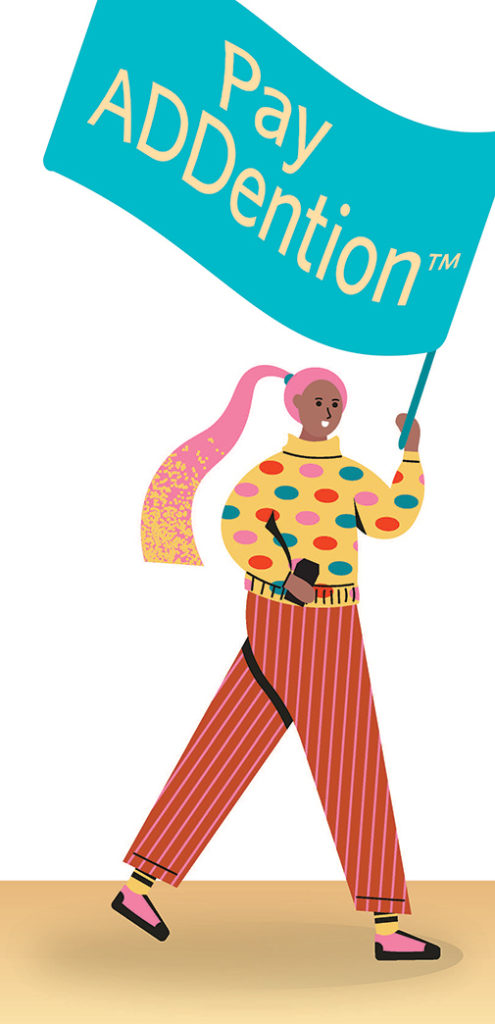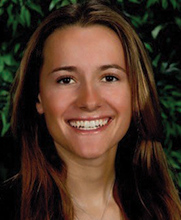Pay ADDention™! I’m a Teen Expert on ADD
Makayla Caliendo
Attention Magazine October 2021
Download PDF
I am a seventeen-year-old senior in high school, and I’ve had ADD—ADHD without hyperactivity—my whole life. I’d like to share my story with you, which is a story of challenges and setbacks as well as success and hope.
 My parents noticed signs of trouble when I was just fourteen months old. I wasn’t making the sounds that would be expected at that age, so I started to receive speech therapy services through the regional center and then, later, through the local school district.
My parents noticed signs of trouble when I was just fourteen months old. I wasn’t making the sounds that would be expected at that age, so I started to receive speech therapy services through the regional center and then, later, through the local school district.
In preschool, I would stare out the window while everyone else was learning and sitting quietly in circle time. At age four and a half, my ADD was diagnosed, and by this time, I had already been receiving not only speech therapy but also sensory integration therapy.* Tags, socks, and certain clothes made me uncomfortable and unable to focus.
There is a pretty crazy story that demonstrates the severity of my sensory issues at that time.
On Thanksgiving afternoon, a hotel security guard knocked on our door to investigate a possible case of child abuse. Several guests had reported hearing screams coming from our room.
When my mother opened the door, they could immediately see that there was no child being abused. Instead, they found me, having a meltdown, not wanting to wear that itchy holiday sweater. It was that day that my mother came to understand the severity of my sensory issues. Needless to say, she didn’t make me wear that itchy, holiday sweater after all.
As much as I couldn’t stand how certain things felt on my skin, I had absolutely NO problem smearing shaving cream and flubber all over myself during preschool art activities. Other kids were sent to school in their best clothes. My mother sent me to school prepared for new stains to decorate my already stained clothing.
MY PARENTS DECIDED to have me repeat pre-kindergarten, and that was a really good decision because it helped me to catch up. Just this year, I realized that the “age cut-off” explanation my parents had given me wasn’t quite adding up. They’d kept that information from my brother and me, not knowing if he would torture me or not with it. Lucky for me, my brother is one of my best friends and would never do that.
I tried many programs: Kumon, private tutors, computer programs for word processing disorders, and summer bridge programs offered at the local school district and community college. The summer bridge programs were especially helpful. Participating in bridge programs led to less stress, as it helped me remember everything over the summer, which normally, I would tend to forget over those three months off. My skills in math and reading comprehension improved during the summer months, helping me to catch up.
I tried sports to help clear my brain and improve focus. In softball, I was voted the MNP (Most Noticeable Player) because I would practice my karate in the outfield. Yes, I said karate, and I sure got a lot of attention from the coach that season.
My parents tried to help improve my focus through diet. We tried no wheat, no sugar, no red dye. By age seven, it was clear that we needed to try something else, so the doctor prescribed medication to help me with my concentration.
We tried one, then another, and another. We tried five different kinds before I finally found one that worked for me. I was on the medicine for four years, but because I was so skinny and was getting sick all the time, it came down to my education or my health. So, of course, we chose my health. I was in the fifth grade and only forty-five pounds when I stopped taking the medication, which was twenty-six pounds below the average eleven-year-old girl. That’s the size of my full-grown dog.
My fifth grade teacher was really supportive when I was going off of the medication, and that made a real difference for me. Because he took an interest in me and checked in often, I was better able to stay on task. He gave me advice and included me in the problem-solving process.
Throughout elementary school, my mom tried to get me an IEP. She wasn’t able to succeed in getting me that official help, but was able to get some help by meeting regularly with my teachers. She also volunteered often in the classroom and learned which of the teachers’ methods and phrases she could use to help me with my work at home. This was very helpful.
Finally, in middle school, I was given a 504 plan. I really started to understand that I had ADHD (without hyperactivity) and what that actually means in sixth grade.
FINDING OUT THAT I HAD THIS DIAGNOSIS didn’t make me feel any better. I understand that parents might be relieved to have a specific diagnosis, because then, they can call the right specialists, join support groups, and read up on the subject. For me, it just confirmed that I was different from other students and had something wrong with me. This really affected my confidence and self-esteem.
ADHD affected my early grades and information retention. I left those early school years with less knowledge than my peers, and that made me feel dumb.
In my 504 plan, I have many helpful accommodations, such as sitting in the front of the classroom, getting extra time on tests and homework if needed, and taking tests in separate room with fewer distractions.
I found that it’s really important to collaborate with teachers about my 504 plan. I have to make sure the teachers are aware of the plan and give me the accommodations. I sometimes have to advocate for myself and recognize that it’s okay to ask a lot of questions.
In sixth grade, my mother put me into an after-school program called homework club. I was really upset with her at first, but I ended up loving it. I was able to work with classmates on homework assignments and was able to get extra help from the teachers there.
This quiet place, where I was able to focus, became crucial to my growing success. So crucial, in fact, that homework club was added to my 504 plan to ensure that I would always be guaranteed to get one of the limited seats.
I continued to struggle academically through sixth and half of seventh grade, but something started to happen at the end of seventh grade.
Things started to turn around, and suddenly, I started doing well in school. I started figuring out study strategies that were helpful and realized that I needed to do things for myself. Exercise and a part-time job helped to increase focus and a feeling of responsibility.
There was a also a certain level of maturity and impulse control that I was suddenly able to use.
Well, if you were to ask one specific teacher, she would say that there was little to no change in my chattiness that year. Although I’m sure I drove her crazy, there are some things that I wish she hadn’t done such as asking, “Why aren’t you paying attention?” and calling me out in front of the entire class.
I would have preferred she take me aside and address her concerns one-on-one instead. Most teachers, however, noticed that I was more focused and getting much better grades.
When I get fidgety in class, I put my hands between my thighs, and I try to maintain eye contact with the teacher. I’ve noticed that rings and clicking pens are too distracting so I leave them at home.
During my struggles with ADD, I felt different from everyone else in that I felt I wasn’t normal and that no one wanted to be my friend.
Some important things kids with ADHD need from their parents are patience and understanding. Instead of shaming them into doing what needs to be done, strategize with them. Instead of asking, “Did you do your homework?” ask,” “How’s your homework going today?” And finally, to avoid overwhelming them, request that they do one task at a time.
TODAY, I DO STILL STRUGGLE with concentration and organization.
I do still have an occasional setback and find that life can be challenging, but I have figured out a lot of strategies that help me with school.
I make a homework schedule and stick to it and only focus on one subject at a time. I run an essential oil diffuser in my room while I work, and I sometimes take omega-3 fish oil supplements for concentration. I find that a homework buddy or homework club is very helpful in avoiding procrastination and can make studying fun. I use the Quizlets website to study, and even make up songs or find YouTube songs to help me memorize difficult content. I keep track of assignments in a calendar planner, referred to as a “reminder binder,” and I color code my lecture notes, with commentary in red, potential test questions in green, etc. Most importantly, perhaps, I’m not shy about contacting my teachers through email or during their office hours if I need extra help.
These days, I’m finding that I celebrate my successes way more than fixating on my challenges.
Today, I am an honors student, getting all As, and I am preparing my college applications. I’m an ambassador for my high school, a sailing and SUP instructor and a leader on a sailing team.
I am also the founder of a program called Pay ADDention™, which I have trademarked. I meet for free with kids in person or via Zoom to share my personal experience with ADD, and I give them tips on how they can manage theirs.
Now that I look back, I recognize that there was—and is—nothing wrong with me. Everyone has challenges in life, and ADD is mine.
According to CHADD, I am not alone.
I am just one of six million kids who have ADHD in the United States. I am just one of 129 million kids worldwide who have ADHD.
I want to make sure everyone knows that ADHD is very common and that you are not alone.
I want you to know that there is help, and there is hope.
We do not need to stand alone.
NOTES
*Speech delays and sensory issues often co-occur, but are not part of the ADHD or ADD diagnosis.
 Seventeen-year-old Makayla Caliendo is a senior in high school.
Seventeen-year-old Makayla Caliendo is a senior in high school.
If you have a child who is interested in talking to someone who has faced similar challenges, Makayla can be reached at PayADDention@gmail.com.
Other Articles in this Edition
Resilience and ADHD During the Pandemic
Challenges in ADHD Care for Children of Color
PART ONE
Pay ADDention™! I’m a Teen Expert on ADD
Study Skills for Thriving with ADHD
Raph’s Tale, A Fable About Neurodiversity
Black Adults Who Live with ADHD
